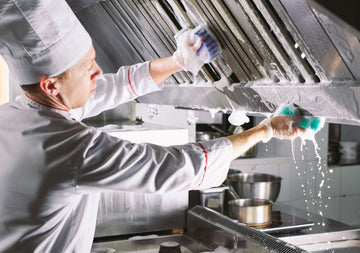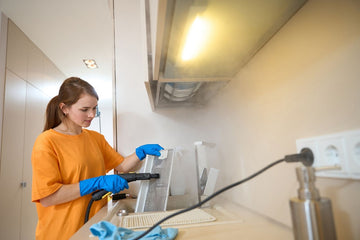An insight into the stringent cleaning rituals that uphold the reputation of culinary kitchens.
Professional chefs prioritize not only the taste and presentation of their dishes but also the cleanliness of their kitchens. In this guide, we unravel the techniques and methods chefs use to keep their kitchens pristine.
Cleaning Agents Used by Chefs
Delving deep into the trusted cleaning agents that champion professional kitchen cleanliness.
- Chemical vs. Natural Cleaning Agents: While many chefs resort to strong agents like bleach and ammonia for a bacteria-free kitchen, natural ingredients like cleaning with vinegar and baking soda also find their rightful place for certain cleaning tasks.
- Trusted Agents in a Chef's Kitchen: Dish soap, detergents, and elbow grease paired with hot water often become the first line of defense against dirt and grime. The age-old technique of "rinse and repeat" ensures a spotless finish.

Daily Cleaning Rituals
Everyday practices that ensure a germ-free cooking space.
- End-of-Day Clean-up: Scrubbing cooking surfaces with a reliable scrub brush, sanitizing utensils, and ensuring all dishes are either hand-washed with dish soap or placed in the dishwasher are pivotal daily tasks.
- Maintaining a Shine: Using detergents and polish ensures that every corner of the kitchen not only remains clean but also shines.
Weekly and Monthly Deep Cleaning
The essential deeper cleaning routines that keep kitchens in top-notch condition.
- Appliances and Nooks: Even the most diligent daily cleaning can miss spots. That's where a detailed scrubbing session with a scrub brush and baking soda mixture can help in reaching those hard-to-clean areas.
- Scheduling is Key: Setting aside specific days for deep cleaning ensures the kitchen remains gleaming and germ-free.
Cleaning Specific Kitchen Areas
Tailored techniques to tackle different kitchen zones.
- Ovens and Hoods: Ammonia can be a chef's best friend here, breaking down stubborn grease and stains. However, always ensure good ventilation when using strong chemicals.
- Countertops and Tables: A mixture of dish soap, hot water, and a splash of vinegar can make countertops shine and remain bacteria-free.

Safe Food Handling and Storage
Connecting cleanliness with the safety of the Food.
- Storing Food Safely: A clean kitchen also means ensuring that food storage areas are spotless. This involves regular checks, cleaning, and sanitizing of storage areas.
- Handling with Care Clean hands, clean utensils, and a clean environment are the triad of safe food handling.
Handling Kitchen Waste
Efficient waste management techniques in professional kitchens.
- Waste Reduction: A clean kitchen is also an efficient one. By reducing waste, chefs can ensure a more sustainable and efficient kitchen environment.
- Disposal Techniques: Ensuring that waste is segregated and disposed of correctly is vital. This involves using dedicated bins for biodegradable and non-biodegradable waste.
Importance of Personal Hygiene
Personal cleanliness as a cornerstone of a pristine kitchen.
- Daily Rituals: Chefs understand that they themselves should be as clean as their kitchens. This includes regular hand washing, wearing clean uniforms, and practicing good personal hygiene.
- Training and Standards: Many professional kitchens have stringent personal hygiene standards that all staff members must adhere to.

Training and Implementing Kitchen Cleaning Techniques
Ensuring that the entire kitchen staff is on the same cleanliness page.
- Regular Training: Workshops and regular training sessions ensure that all kitchen staff are updated on the latest cleanliness standards and techniques.
- Consistency is Crucial: A clean kitchen is a combined effort. Consistency in training ensures that the kitchen remains spotless day in and day out.
Conclusion
Emphasizing the undying connection between culinary excellence and cleanliness. In the culinary world, a clean kitchen is just as important as a delicious dish. With the right cleaning agents, techniques, and training, professional chefs ensure that their kitchens are always in impeccable condition, ready to produce the next culinary masterpiece.
Frequently Asked Questions
Can vinegar be used as a cleaning agent in professional kitchens?
Yes, vinegar is a versatile cleaning agent, especially when combined with other ingredients like dish soap.
What's the importance of personal hygiene standards in professional kitchens?
Stringent personal hygiene prevents food contamination and ensures the overall kitchen cleanliness.
Are there any specific tools recommended for daily cleaning?
Yes, tools like scrub brushes, sponges, and dish soap are essential for daily cleaning.




